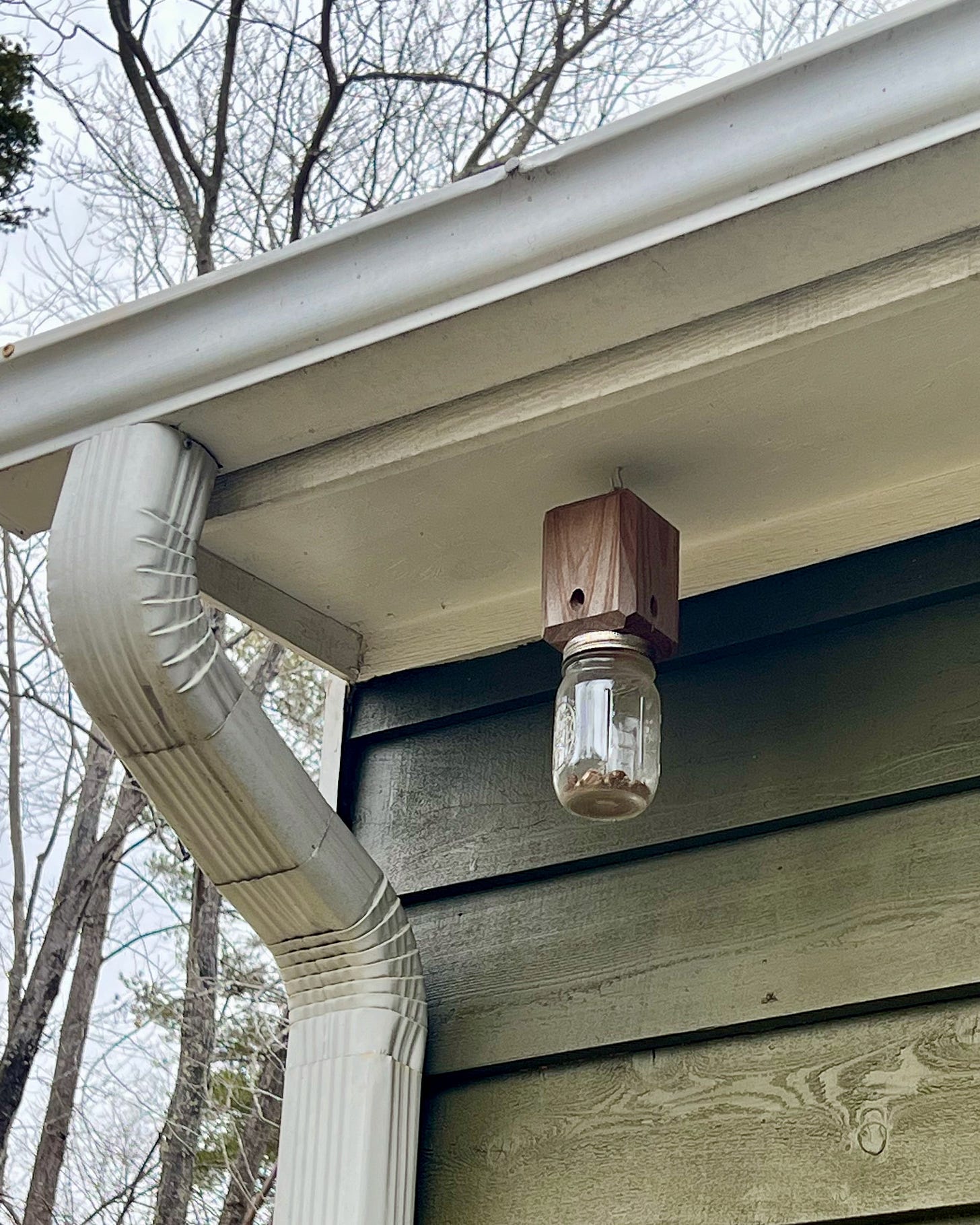Practice, Clarity, Downsizing, and Maps
February 2025 | Note from Jim
This month: clarity, using maps, insurance, downsizing, sucking, and evolving concessions.
Quick Market Thought
Resale inventory remains low, prices are stable to up a bit, days on market are trending upwards, and my first weekend theory holds — good properties well priced, well presented, are moving quickly, often with multiple offers.
In Charlottesville + Albemarle:
2024 - In the first 46 days, 197 resale homes were listed and 152 resale homes went under contract. Median Days on Market was 5. 87 (57%) of those that went under contract went under contract in 7 days or less.
2025 - In the first 46 days, 184 resale homes were listed and 122 resale homes went under contract. Median Days on Market was 7. 65 (53%) of those that went under contract went under contract in 7 days or less.
Clarity
The real estate process is opaque to so many, in part because most people buy or sell homes only a few times in their lifetimes. My role is to provide and show the path to clarity. I tell all of my clients, “I want you to ask me your questions. I know you’re going to ask your parents, peers, search engine, and maybe ChatGPT, but please ask me so I can give you the best answer relevant to you and our market.
I find it moderately amusing that my opening is about clarity and my second segment is about chaos.
Something about the things we can control, and the wisdom to know the difference…
The market — any market — dislikes uncertainty, and right now, we have an awful lot of uncertainty. One of my roles is to help distill the meaningful from the superfluous, and the data can help. Feelings absolutely matter, and they must, and the data analysis is what can drive what my work with my clients.
The Federal Government is pulling people back to the office. The Charlottesville market is not going to be unscathed and it is too soon to know anything, really, about the chaos underway, so I’ll put three thoughts out there:
We may have more inventory coming to the sale or rental markets as those affiliated with the government are called back to the office.
We may have fewer buyers in the market; the Charlottesville area has a significant work-from-home population and we always have.
We may have more people trying to buy homes so that they can feel secure and safe, knowing that while their taxes and insurance will go up, their mortgage will stay mostly the same, and most importantly, they know where they will live until they choose to move. I wrote a few months ago about a first-time homebuyer client who said that buying her first home was “exciting, scary, and overwhelming.” Buying or selling a home is by definition traumatic. My role is to help my clients prepare and execute the plans and decisions that are right for them.
We don’t yet know what the market will do - will HUD even exist in three months? What about VA loans? We have so many questions and few answers as of yet.
Related, a client recently said this to me in the context of wanting a home, and not being house poor, “I don’t want to miss life in order to have a home.” I’ll be using this for a long time.
Maps are Good.
This is how I learned my hometown. While I’d lived in Charlottesville for most of my life, I didn’t know it. My Realtor mom would give me some far-flung (or not so far-flung) address, and my own ADC map book, and tell me to go do it. Frustrated, confounded, and occasionally lost, I found my way. Cell phone coverage was less ubiquitous when I started in 2001, so I needed to find my way. I’d map and frequently drive my tomorrow showings so I could confidently show the property. Practice matters.
And I learned, although I still get confused as to where Elliott and Monticello come out on Avon Street.
Knowing where to go is a crucial part of knowing my real estate market. I’d like to think that buyers trusted me more when we’d get in the car together and I knew where to go without GPS. If we both need to use GPS, I’m no better informed than they are.
A client gave me some old real estate maps. I’m a real estate dork, and was excited. Look how small Crozet was!

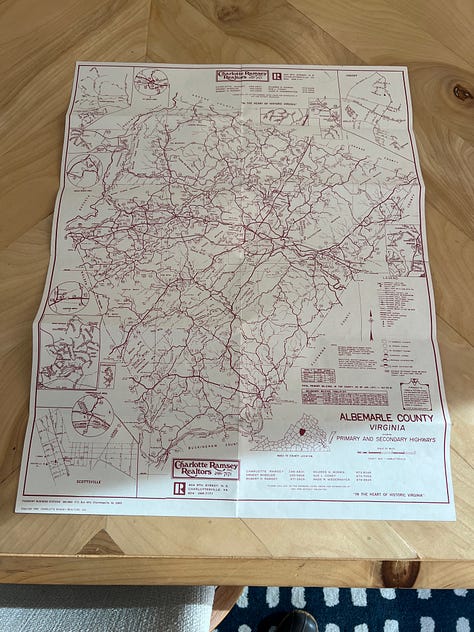
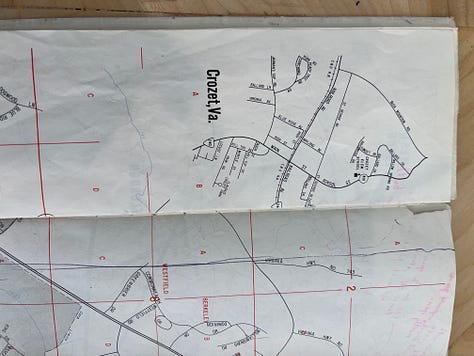
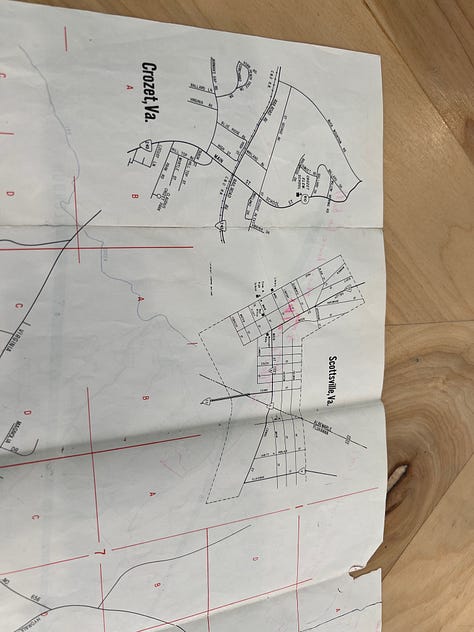


Maps are good; these are some I’ve used with buyers
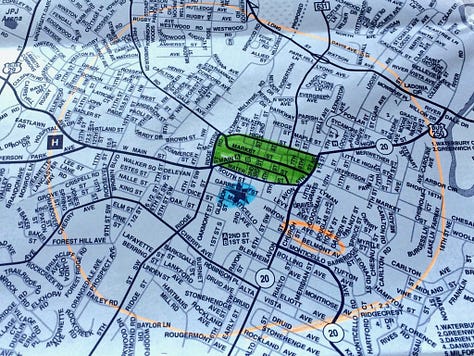



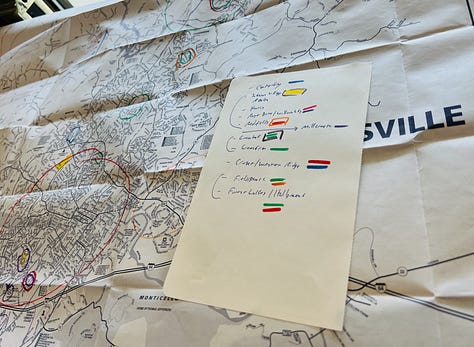
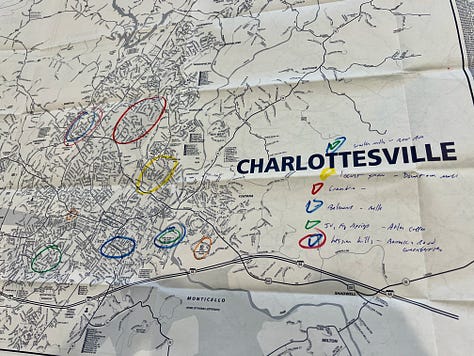
If you’ve worked with me, I’ve likely said a variation of this to you: “I love technology, and like to think I use it appropriately. And part of knowing tech is knowing when analog is more valuable.”
Explaining to a new client where things are is just easier on a physical, tangible, take-it-with-you map. Pointing, drawing, and identifying the misspellings. (Have you heard about “trap streets?” Now you have.)
Here are some tips for navigating without a cell phone. When my wife and I travel and I have to use GPS, I put one AirPod in, and listen to the guidance from my phone so that I am able to look around. Sounds simple, and it is, and it’s better than staring at a phone in a new foreign city.
Homeowners insurance Addendum
I have successfully presented and used, since the end of 2024, the Homeowners Insurance Addendum. I’ve written about homeowners insurance often, including this one in late 2024.
Finally, other agents are coming around and understanding that homeowners insurance is a potentially volatile part of the real estate transaction. It’s only taken about 19 years.
One reason for the reluctance of other agents to use this form? The market has been so hot for so long that adding another contingency was not desirable — I have used this form as a nudge for my clients rather than actually presenting it — and the insurance market was not what it is now. Hint: climate disasters are making the insurance market more volatile.
Another reason for the reluctance: ignorance and complacency. Not until you touch you’ve had a client burned by a shockingly high insurance rate, or had a transaction fall apart unexpectedly due to insurance do you understand, and feel the risk and pain. This is one reason fewer agents have as yet understood and thus, hard for them to explain and add context to their clients.
If you’re not doing this — touching, feeling, practicing — you’re not going to understand the market, much less be able to cogently explain it.
What sucked about buying or selling?
Looking back, what were the pain points? What could I have done differently? What would you have done differently? I am genuinely curious to hear what you would do to better the process.
Downsize now.
A client said I should write this, so I am.
Downsize now. When you’re old, downsizing will be a lot more work, not merely because you’ll have more stuff — stuff you know you don’t need or want, but just have accumulated — but also because moving more stuff as you get older is harder physically and psychologically.
Another client once said that moving is one of the greatest non-emergent traumas you can inflict upon your family.
One day I was telling my older daughter she needed to get some stuff out of our house. My younger daughter, her staunchest ally, immediately jumped in with, “Dad! You still have stuff at [Grandma’s] house!” She’s right. I’m pretty sure I have some lacrosse gloves and pads in the basement.
Anticipatory downsizing is hard. We all know the train is coming.
Having less stuff may make that trauma a little bit less traumatic. Or so they say.
Seller concessions
How it should work and how it is working. Two different things.
We can get into how the NAR settlements should have affected the marketplace, and then we’d talk about how they have affected the marketplace. Ask me; let’s grab coffee; this new world is complicated.
From the mouth of a seller client when we are having the discussion as to whether they will offer concession (commission) to the buyer agent. “Yes, we’ll offer x% for a full price offer, and won’t for less than a full price offer.”
Perfect. Simple. Clear and concise.
THAT is why when representing buyers we have the compensation conversation first before we choose to work together.
That is also why I advise my sellers up front about the actual market dynamics we are seeing.
Continuing the unintended but embraced theme of this note: Practice and reps make for a better professional. One of my early mentors said to me - “If you’re not doing at least 10 sides a year, you’re not screwing up enough to get better.” He was right. Real estate is not a part-time thing; I’ll never be perfect, but I do practice an awful lot, and my clients benefit from that.
A client asked recently about my ratio working with buyers and sellers.
Since 1 January 2023, I have represented to 24 sellers and 35 buyers to closing. I made mistakes. I learned. I’d like to think I got better at my craft.
I had a clause that contained the word “major.” One time, the parties could not agree on what was “major,” so I removed the ambivalent “major” from the clause.
Consumers, before you hire someone to represent you, make sure that person is getting enough reps to best represent you.
What I’m Reading
A Murder of Crows. Everything Jessica writes is exceptional.
Analysis = Facts + Interpretation - this is how I practice with my clients.
There’s a market for non-smart appliances, and cars. Your New Car Isn’t Yours - Automakers Increasingly Charge ‘Subscription Fees.’
Bringing New Habits Into 2025: Meditation. One day, maybe.
Climate/insurance
Transportation
Home
What are the first things to do after buying a home? - Reddit
Rising Home Equity Keeps People In Place, Exploding Remodeling Tech - Forbes
“Americans are now spending more time alone than ever. It’s changing our personalities, our politics, and even our relationship to reality.” - The Atlantic
What I’m Listening To
Donny Talks about Toilets - this is good.
No bike photos this month; I’ve been nursing an injury.
Next month —
What do the first two months of market data tell us?
One *big* thing sellers in the Charlottesville market need to know before signing with an agent to represent them. (it’s simple, and obvious, and I see it quite a bit)
Beginners’ Mind and the market



